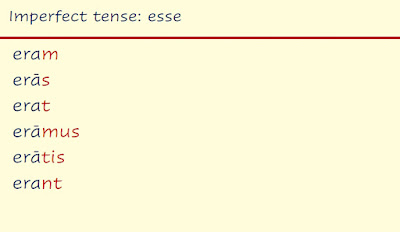Demaratus talks about the time when his country wasn’t occupied by the Romans:
“Multa
saecula Athēnae, patria mea, līberae erant. Nōs Graecī līberī erāmus cūnctī,
dum in nostrīs oppidīs līberī habitābāmus. Interdum tyrannī in nōnnūllīs
oppidīs rēgnāre studēbant, sed Graecī vītam līberam valdē amābant et tyrannōs
ut adversāriōs fugāre solēbant.”
Tum
Epicharmus: “Pīsistratus quidem multōs annōs imperium Athēnārum obtinēbat, quod
bonus et iūstus erat…”
Sed Mārcus: “Dionȳsius autem Syrācūsānīs totidem ferē annōs imperābat, quamquam neque bonus neque iūstus, sed iniūstus et malus erat: Populum enim iniūriīs terrēbat, multōs virōs integrōs necābat. Dionȳsiō quidem magnum rēgnum, magnae dīvitiae erant; neque tamen beātus, immō vērō miser erat, quod semper īnsidiās timēbat.”
[1]
This text uses the imperfect tense; this tense describes:
[i]
what somebody was doing i.e. an action that was incomplete
[ii]
what somebody used to do i.e. an action that happened frequently in the
past
[iii]
an action that took place or a situation that existed over a period of time
with no real sense of beginning or end e.g. what the character of a person was
like
dum
in nostrīs oppidīs … habitābāmus │ while we were living / used
to live in our towns
Nōs
Graecī līberī erāmus …│ We Greeks were / used to be free
semper īnsidiās timēbat │ he always feared
/ used to fear treachery
bonus
et iūstus erat │ he was good and just
Pīsistratus
… multōs annōs imperium … obtinēbat │ Pisistratus … held
political power … for many years
Dionȳsius autem Syrācūsānīs
totidem ferē annōs imperābat │ Dionysius ruled the
Syracusans for almost as many years.
[2]
a verb to look out for is soleō, -ēre [2]: to be accustomed (to
doing something); it is used with an infinitive and can translate as
somebody who usually does or did something i.e. the verb conveys a frequentative
meaning.
Graecī
… adversāriōs ¦ fugāre ¦ solēbant │literally: the Greeks ¦ were
accustomed ¦ to putting ¦ enemies to flight = the Greeks usually chased
their enemies away
[3]
Links to all posts on the imperfect tense:
https://www.facebook.com/groups/latinforstarters/permalink/469186202359320/
https://adckl.blogspot.com/2024/07/220824-maxey-11-2-past-tenses-2.html
[4]
Latin tutorial: imperfect tense



No comments:
Post a Comment